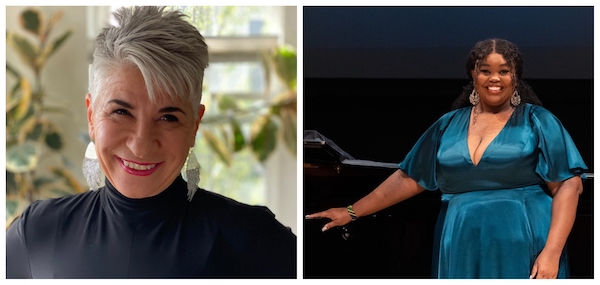by Jarrett Hoffman

A roundup of the classical categories from the 2024 Grammy Awards, presented last night in Los Angeles, can be found here from Philadelphia’s WRTI.
Among the notable highlights for Northeast Ohio: Shaker Heights’ Elaine Martone (pictured, left) won “Producer Of The Year, Classical” for a list of albums that included three from The Cleveland Orchestra and one from the ensemble Sirventés, which features several members of the Orchestra. And the award for “Best Classical Compendium” went to Passion for Bach and Coltrane, an album featuring Oberlin Conservatory horn professor Jeff Scott’s work of the same title, performed by orator and poet A.B. Spellman, the Imani Winds (founded by Oberlin alumni), the Harlem Quartet, and the jazz trio of Alex Brown, Edward Perez, and Neal Smith.
See the full list of winners here.
And Oberlin fourth-year soprano Elizabeth Hanje (above, right) has won First Prize and $10,000 at the Houston Grand Opera’s 36th Annual Eleanor McCollum Competition for Young Singers. This came after Friday night’s Concert of Arias, in which Hanje sang “Il est doux, il est bon” from Jules Massenet’s Hérodiade and “Ain’t it a Pretty Night” from Carlisle Floyd’s Susannah. Friday’s performances and the awards ceremony were livestreamed and remain available to watch on YouTube.
TODAY’S ALMANAC:
by Daniel Hathaway

Norwegian composer and violinist Ole Bull entered the scene in Bergen in 1810.
The other two were born in France — Jacques Ibert in Paris in 1890, and Ivan Tcherepnin near Paris on this date in 1943. Ibert makes today’s honors list having written fine to his career in the French capital on February 5, 1962.
Bull figures importantly in the establishment of Norwegian independence from Sweden, including the co-founding of Det Norske Theater in Bergen, where Norwegian was established as the house language instead of Danish.
He also encouraged the talent of Edvard Grieg, whom he met in 1858 when Norway’s most famous composer-to-be was only 15, and leveraged his admission to the Leipzig Conservatory.
As one of the leading touring virtuosi of his era, Bull collected important violins, performed with Liszt, and made several tours to the United States, where he bought land and established Norwegian communities. As a result, today you can visit Ole Bull State Park in the Susquehannock State Forest, enter Ole Bull’s concert hall at Mammoth Cave in Kentucky, and check out Ole Bull Cottage in Eliot, Maine, originally meant to be a music school.
For a taste of Bull’s music, listen to his Grand Concerto, Op. 4, performed by Annar Follesø with Ole Kristian Ruud and the Norwegian Radio Orchestra, or his somewhat shorter Concerto Fantastico with the same artists.
And/or watch a documentary where two sisters, Ragnhild Hemsing and Eldbjørg Hemsing, go on a quest to discover the secrets behind the virtuoso’s tone.
Ivan Tcherepnin, who came from a family of Russian composers, studied with Leon Kirchner, Karlheinz Stockhausen, and Pierre Boulez, and taught at the San Francisco Conservatory and Stanford before becoming director of Harvard’s Electronic Music School from 1972 until his death in 1998.
Alas, I haven’t been able to locate recordings of what are said to be two of his defining works: the Double Concerto for Violin, Cello, and Orchestra that won the 1996 Grawemeyer Award, or his Samur Opera, which earned the Grand Prize at Austria’s 1982 Ars Electronica Festival. Any clues from our readers?
Jacques Ibert shared the predilection of 20th century French composers to write for wind instruments. Who could ask for a more alluring performance of his Trois Pièces Brèves than that played (and choreographed!) by Carion? Begin here and click here for the last two movements.
But for sheer cuteness, here’s a video posted by pianist Conrad Tao of his performance of Ibert’s Le petit âne blanc (“The Little White Donkey”), captured at the tender age of 6.



